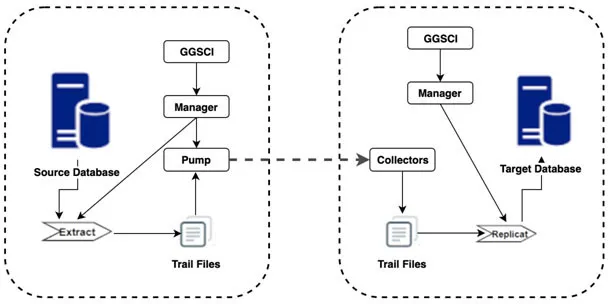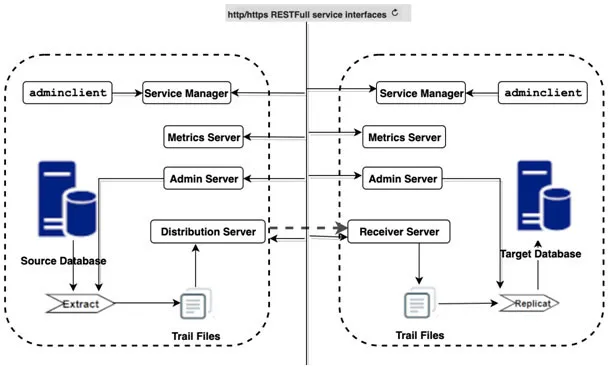
eBook - ePub
Oracle GoldenGate With Microservices
Real-Time Scenarios with Oracle GoldenGate
Yenugula Venkata Ravi Kumar,
This is a test
Buch teilen
- English
- ePUB (handyfreundlich)
- Über iOS und Android verfügbar
eBook - ePub
Oracle GoldenGate With Microservices
Real-Time Scenarios with Oracle GoldenGate
Yenugula Venkata Ravi Kumar,
Angaben zum Buch
Buchvorschau
Inhaltsverzeichnis
Quellenangaben
Über dieses Buch
A step-by-step guide to practising Oracle GoldenGate High Availability (HA) options, Microservices, and Real-Time downstream techniques Key Features
- Understand how and when they're used classic Vs. Microservices
- Learn how to use real-time downstream methods based on the environment
- Learn how to solve Oracle GoldenGate (OGG) Conflict Detection and Resolution (CDR) in bi-directional, active replication
- Learn how to implement high availability for mission-critical systems using Oracle GoldenGate – XAG components
- Learn how to set up bi-directional replication between pluggable databases (PDBs) in a multi-tenant environment
- Learn how to use differently typed of replicates in pluggable databases (PDBs) in a multi-tenant environment
-
Description
The book starts with a brief introduction about Oracle GoldenGate with Microservices and how to configure high availability using various methods. Oracle GoldenGate Microservices Architecture (MA) is a similar architecture based on REST APIs which enable us to configure, monitor, and manage Oracle GoldenGate services using a web-based user interface. Each module supports a specific business goal and uses a simple, lightweight, and well-defined interface to communicate with other sets of services. What will you learn
By the end of the book, you will come across a few case studies about how to use Microservices, Kubernetes, REST APIs in Oracle GoldenGate, and How to monitor Oracle GoldenGate processes in real-time environments. This book also helps how to use various file systems like ACFS, DBFS, and NFS in high availability for Oracle GoldenGate. Who this book is for
This book is intended for anyone looking for how to set up and configure Uni-directional, Bi-directional replication in mission-critical environments either using classic Oracle GoldenGate OR Oracle GoldenGate with Microservices. This book also helps various methods to implement real-time downstream techniques. Table of Contents
1. Introduction to Oracle GoldenGate HA - XAG Components
2. Extract and Replicat in Multitenant Environment
3. Consolidated and Cascaded Oracle GoldenGate
4. Introduction to Oracle GoldenGate Methodologies
5. Introduction to Oracle GoldenGate Utilities
6. Bi-Directional Replication with Conflict Detection and Resolution (CDR)
7. Bi-directional Replication with Pluggable Databases (PDBs) in Multitenant Environment
8. Real-Time Downstream Database with Multiple Scenarios
9. Oracle GoldenGate Microservices Architecture overview
10. Managing Oracle GoldenGate and Kubernetes
11. Automation Recipes Via Rest APIs
12. Oracle GoldenGate Tuning and Troubleshooting About the Author
Yenugula Venkata Ravi Kumar (YVR) is an Oracle ACE Director and Oracle Certified Master (OCM) with 22+ years of experience in the banking, financial services, and insurance (BFSI) verticals. Mariami Kupatadze is an Oracle Certified Master since 2016. She is the first OCM in her country, Georgia. Mari is a member of the ACE program. She has published several articles in OraWorld e-magazine and Oracle Technology Network. Mari has been a speaker in APAC Oracle Users Groups Community (APACOUC) and Luxembourg Oracle Users Group (LUXOUG). Konstantin Kerekovski is an Oracle professional with more than seven years of experience in the financial services industry. He is a member of the Independent Oracle User Group, Suncoast Oracle User Group, and New York Oracle User Group. Tridib Das is a Senior Database Administrator with more than 9 years' experience on Oracle and MySQL.
Häufig gestellte Fragen
Wie kann ich mein Abo kündigen?
Gehe einfach zum Kontobereich in den Einstellungen und klicke auf „Abo kündigen“ – ganz einfach. Nachdem du gekündigt hast, bleibt deine Mitgliedschaft für den verbleibenden Abozeitraum, den du bereits bezahlt hast, aktiv. Mehr Informationen hier.
(Wie) Kann ich Bücher herunterladen?
Derzeit stehen all unsere auf Mobilgeräte reagierenden ePub-Bücher zum Download über die App zur Verfügung. Die meisten unserer PDFs stehen ebenfalls zum Download bereit; wir arbeiten daran, auch die übrigen PDFs zum Download anzubieten, bei denen dies aktuell noch nicht möglich ist. Weitere Informationen hier.
Welcher Unterschied besteht bei den Preisen zwischen den Aboplänen?
Mit beiden Aboplänen erhältst du vollen Zugang zur Bibliothek und allen Funktionen von Perlego. Die einzigen Unterschiede bestehen im Preis und dem Abozeitraum: Mit dem Jahresabo sparst du auf 12 Monate gerechnet im Vergleich zum Monatsabo rund 30 %.
Was ist Perlego?
Wir sind ein Online-Abodienst für Lehrbücher, bei dem du für weniger als den Preis eines einzelnen Buches pro Monat Zugang zu einer ganzen Online-Bibliothek erhältst. Mit über 1 Million Büchern zu über 1.000 verschiedenen Themen haben wir bestimmt alles, was du brauchst! Weitere Informationen hier.
Unterstützt Perlego Text-zu-Sprache?
Achte auf das Symbol zum Vorlesen in deinem nächsten Buch, um zu sehen, ob du es dir auch anhören kannst. Bei diesem Tool wird dir Text laut vorgelesen, wobei der Text beim Vorlesen auch grafisch hervorgehoben wird. Du kannst das Vorlesen jederzeit anhalten, beschleunigen und verlangsamen. Weitere Informationen hier.
Ist Oracle GoldenGate With Microservices als Online-PDF/ePub verfügbar?
Ja, du hast Zugang zu Oracle GoldenGate With Microservices von Yenugula Venkata Ravi Kumar, im PDF- und/oder ePub-Format sowie zu anderen beliebten Büchern aus Informatica & Servizi web e API. Aus unserem Katalog stehen dir über 1 Million Bücher zur Verfügung.
Information
Thema
InformaticaThema
Servizi web e APICHAPTER 1
Introduction to Oracle GoldenGate HA-XAG Components
Introduction
Oracle GoldenGate (OGG) provides data capture and real-time replication mechanisms for heterogeneous databases. The OGG architecture can be implemented for almost all types of replication scenarios. Oracle Grid Infrastructure Bundled Agents (XAG), which is now a part of the Oracle Grid Infrastructure, provides HA and management framework through the AGCTL command line interface.
OGG can be used for a single instance as well as cluster databases. In the cluster environment, GoldenGate can tolerate server failures by moving process to another surviving server. The Real Application Clusters (RAC) database replicated by OGG is considered as a complete high availability (HA) architecture.
Oracle introduced Microservices Architecture from OGG 12.3. The older version is now called Classic Architecture. Oracle Microservices architecture provides access through a secure web interface that simplifies the administration, command line interface, and APIs.
The following illustrates the components of each architecture. The below diagram is a view of an OGG Classic architecture:

Figure 1.1: Oracle GoldenGate Classic Architecture components
The primary access into the OGG classic architecture is via GoldenGate Service Command Interface (GGSCI). From GGSCI, you can control GG processes, such as Manager, Extract (capture), data Pump, and Replicat (apply).
A view of an OGG Microservices Architecture is shown as follows:

Figure 1.2: Oracle GoldenGate MA Architecture components
As you will notice on the diagram, Extract (capture), trail files, and Replicat (apply) are still there. But the following components are modified and added into the MA architecture:
- Service manager: A service manager (SM) is a main interface into the OGG. The SM HTML user interface enables you to see the status of the administration server, the distribution server, the performance metrics server, and the receiver server. From the console, you can start, stop, and query other services and deployments. It acts as the watchdog process for the environment. A service manager is responsible to restart other services that go down.
- Administration server: An administration server is a central management entity for GoldenGate. From a web-based interface, you can create and manage Extract and Replicat processes.
- Distribution server: This server distributes trail files to one or more destination database servers.
- Receiver server: A receiver server coordinates and handles all received trail files.
- Performance metrics server: A performance metrics server collects instance deployment performance results. All performance related metrics are sent to this service from OGG processes.
Additional components in OGG Microservices Architecture are as follows:
- Admin client: Instead of using the GUI interface, you can use the admin client to perform the same tasks. The
adminclientusage example is shown as follows:$ export OGG_HOME=/GG_HOME/ma$ export JAVA_HOME=$OGG_HOME/jdk/jre$ cd $OGG_HOME/bin$ ./adminclientOracle GoldenGate Administration Client for OracleVersion 19.1.0.0.2 OGGCORE_19.1.0.0.0_PLATFORMS_190823.0013Copyright (C) 1995, 2019, Oracle and/or its affiliates. All rights reserved.Linux, x64, 64bit (optimized) on Aug 23 2019 07:49:43Operating system character set identified as UTF-8.OGG (not connected) 5> connect http://localhost:9001 as oggadmin password oggadminUsing default deployment ‘MyDeployment’OGG (https://localhost:9001 MyDeployment) 6> helpAdmin Client Command Summary:! - Executes the previous command without modifications.ADD CHECKPOINTTABLE - Creates a checkpoint table in a database.ADD CREDENTIALS - Create user credentials for use by the Administration Client.ADD CREDENTIALSTORE - (Deprecated) Creates a credentials store (wallet) that stores encrypted database user credentials.ADD DISTPATH - Creates a distribution path.… - Extract process: The capture mechanism of Oracle Golden Gate is called EXTRACT, which runs on a source database. Extract is responsible for capturing committed DML and DDL operations that are performed on objects in the Extract configuration and persisting them to trail files. Multiple Extract processes can operate on different objects at the same time.
- Replicat process: The Replicat process runs on the target system, which reads the trail files and applies them to the target database.
- Trails: A trail is the series of files on the disk where GoldenGate stores the captured data. By default, trails are stored in the
dirdatsubdirectory of the OGG directory and are aged automatically to allow processing to continue without interruption. - Checkpoints: Oracle GoldenGate processes record their read and write positions along the data flow checkpoint files cluster-wide is essentia...